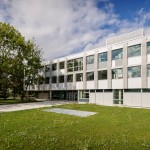
- Homepage
- About the Joint Centre
- Research Areas & Projects
- Researchers
- News & Events
- Open Positions



Mercredi 6 février, 14h30
Batiment I
e-Science and Digital Scholarship
Tony Hey, Microsoft
In the future, frontier research in many fields is increasingly requiring collaboration of globally distributed groups of researchers needing access to distributed data and computing resources as well as support for remote access to expensive, multi-national specialized facilities such as telescopes, sensor networks and specialist data archives. There is also a general belief that an important road to innovation will be provided by multi-disciplinary and collaborative research - from bio-informatics and earth systems science to social science and archaeology. Furthermore, it is clear that we are at the beginning of an explosion in the amount of research data - 100’s of Terabytes and even Petabytes will be common in many fields.
The e-Science research agenda is to provide the researchers with the tools, technology and infrastructure to enable them to focus on research rather than the complications of collaboration and access to facilities. Powerful software services will be widely deployed on top of the academic research networks to form the necessary ‘Cyberinfrastructure’ to provide a collaborative research environment for the global academic community.
This talk will review the elements of this vision and describe how not only scientists and engineers but also social science and humanities researchers are collaborating with computer scientists and the IT industry to create this Cyberinfrastructure. The task of the computer science and IT community is to make this infrastructure as easy to use as today’s Web 2.0 technologies with ad hoc tagging, RSS feeds, blogs, wikis and mash-ups. The researchers need to be empowered to put together collections of services to solve their specific research problems in the way that they want. For a few very technical communities this may involve installation and management of complex middleware but the majority of the research community will need something much simpler. Finally, a key part of the global research Cyberinfrastructure will be services for accessing digital research repositories containing text, data and software. Open access in some form or other to such institutional research repositories is likely to become widespread in the near future. In addition, the whole nature of a scholarly research paper will change dramatically as Web 2.0 and other technologies allow the creation of live documents linked to RSS feeds and data, supplemented by blogs and wikis. This talk will include descriptions of some relevant examples of e-Science and Digital Scholarship.
Tony Hey is Corporate Vice President of the External Research Division of Microsoft Research.